European Diplomat: Agreement ‘Next Week’ On Iran Nuclear Deal
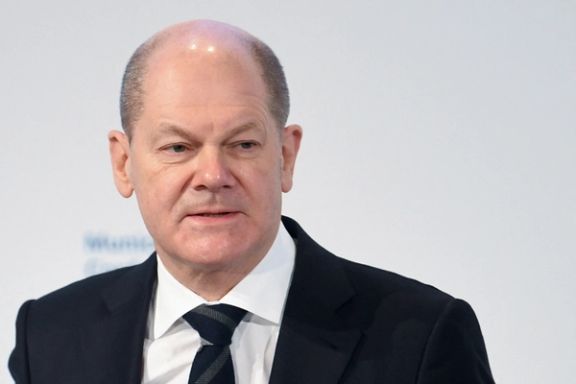
A European diplomat told Iran International Saturday that agreement on restoring the 2015 Iran nuclear deal would be announced next week, with almost all issues now resolved.

A European diplomat told Iran International Saturday that agreement on restoring the 2015 Iran nuclear deal would be announced next week, with almost all issues now resolved.
Others were not so sure. Chancellor Olaf Scholz told the 58th Munich Security Conference (MSC) in southern Germany on Saturday that while all elements for concluding negotiations “are on the table…it’s the case that if we don’t succeed very quickly in this, the negotiations threaten to fail.”
Scholz said talks were at “the moment of truth” and that “the Iranian leadership now has a choice.”
In Tehran, the official news agency IRNA reported foreign minister Hossein Amir-Abdollahian that further clarifications were needed before any agreement in Vienna on the reviving the 2015 agreement, the JCPOA (Joint Comprehensive Plan of Action).
Scholz told participants at the annual security conference that the Vienna talks had come a long way over ten months. He criticized Tehran for increasing the level to which it enriches uranium and for restricting access of United Nations inspectors.
Iran began extending its nuclear program in 2019, a year after United States President Donald Trump withdrew the US from the JCPOA. Last year Tehran reached enrichment of 60 percent, far above the JCPOA cap of 3.67 percent. It also last year reduced UN inspectors’ access to that required under the Nuclear Non-Proliferation treaty.
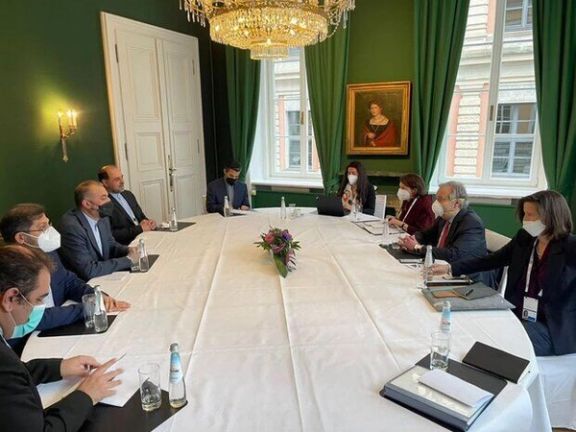
The Iranian foreign minister has said continuing talks are needed to clarify international commitments in restoring the 2015 Iran nuclear deal.
In remarks quoted by the official news agency IRNA, Hossein Amir-Abdollahian told United Nations Secretary-General António Guterres Saturday that talks were needed “with different countries to be prepared for…implementing the agreements reached under the 2015 deal.”
The meeting, on the side-lines of the 58th Munich Security Conference (MSC) in southern Germany, came with growing speculation that broad agreement had been reached in Vienna in Iran’s talks with world powers over reviving the 2015 agreement, the JCPOA (Joint Comprehensive Plan of Action).
A report this week from the Reuters news agency, which hinted at interim arrangements, was dismissed in Tehran. Tasnim news agency, which is linked to Iran’s Revolutionary Guards, noted Saturday that often-anonymous quotes from “western diplomats” in Vienna were speculative or designed to mislead.
"Progress is significant in the negotiation process, but the other side still has to secure Iran's legitimate rights and interests in some key issues," Amir-Abdollahian said. Further talks, he continued, should cover “international cooperation” and Tehran’s foreign policy.
The remarks as reported in IRNA did not clarify whether Amir-Abdollahian was talking about the nitty-gritty of restoring the JCPOA, referencing Iran’s search for European guarantees of open trade with Iran once the JCPOA is restored, or suggesting possible ‘follow-on’ talks as demanded by the United States.
The Reuters report, which the agency said was based on a draft agreement, said a sequence of steps in restoring the JCPOA would begin with a phase in which Iran suspended uranium enrichment above 5 percent and the United States lifted its threat to sanction South Korean banks over repatriating $7 billion Iranian assets. In this phase, Reuters said, the US would not lift ‘maximum pressure’ sanctions on Iran’s oil exports. The report also suggested a prisoner swap between Washington and Tehran could be included.
The IRNA report suggested agreement on restoring the JCPOA was not to be assumed. It quoted Amir-Abdollahian, in meeting German foreign minister Annalena Baerbock, that she should “carefully consider Iran’s red lines…[and] play an effective role in securing the legitimate rights of Iran as a party that was affected by the United States’ unilateral and illegal withdrawal” from the JCPOA.
Amir-Abdollahian further underlined the need for no-one to make a miscalculation in the Vienna discussions by creating media hype. “Tehran is taking heed of both the quality of an agreement and the element of time,” he said. “If Iran’s legitimate demands are taken into account today, an agreement can be reached in Vienna.”
German Chancellor Olaf Scholz told the Munich Security Conference Saturday that time for reviving the JCPOA was running out. "We now have the chance to reach an agreement that will allow sanctions to be lifted,” he said. “But if we do not succeed very quickly, the negotiations risk failing. The Iranian leadership has a choice. Now is the moment of truth."
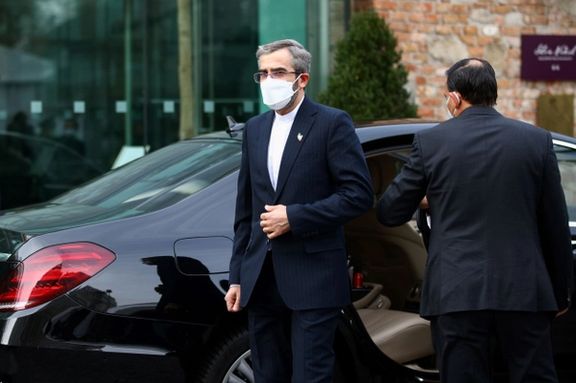
Tasnim news agency in Tehran has dismissed reports about the imminent signing of a nuclear agreement between Iran and world power in the coming days.
Tasnim, affiliated with the Revolutionary Guard, said on Saturday that direct and indirect quotes from Western diplomats in Vienna to the effect that a draft agreement is ready and will be signed next week, “are simply speculations and are not true.”
The agency went on to say that there are still important issues over which no agreement has been reached and talks continue to breach the gaps. These are demands that Iran has been insisting on, it said, and until there is agreement on these issues, talks will go on.
Tehran has been demanding the lifting of all United States’ sanctions and a legal guarantee by Washington that it would not renege on its commitments once a deal is reached. The US has said it will only lift ‘nuclear sanctions’.
Tasnim blamed Western states for putting out false reports to serve their political ends.
Reuters on Thursday reported some details about what it said was a draft agreement reached in Vienna in to pave the way for the restoration of the 2015 Iran nuclear agreement. It said that the 20-page document still needs agreement on some issues and nothing is final until everything is agreed upon.
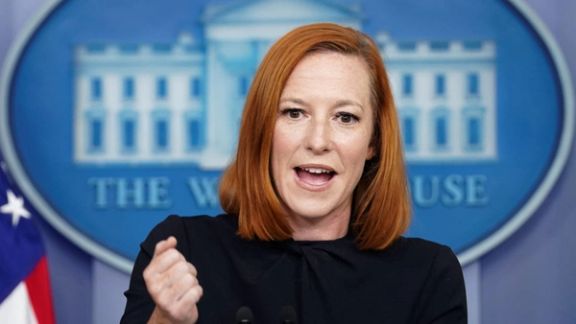
While Washington reiterated Friday that “substantial progress” is being made in nuclear talks with Iran, critics continued to express concern over a "bad deal."
“We feel substantial progress has been made in the last week and is continuing to be made,” White House press secretary Jen Psaki told reporters on Friday. She repeated the administration’s position that “If Iran shows seriousness, we can and should reach an understanding on mutual return to full implementation of the JCPOA within days.”
Asked about a letter sent to President Joe Biden by 170 Republican members of Congress questioning the administration’s effort to revive the 2015 agreement, Psaki claimed she does not “have any information on the letter.”
One critic of the policy said, “Biden better start marshaling a strategy because merely being on defense over a mutual JCPOA return is not going to cut it.”
Senate Foreign Relations Committee chairman Bob Menendez (D-NJ), on Friday repeated his serious concerns about the handling of the talks with Iran he had first voiced on the Senate floor earlier this month.
In a meeting with supporters of AIPAC, a powerful advocacy group for Israel, Menendez said he made his Senate speech because he felt “his colleagues had been focused on other issues in recent weeks … and we are not paying attention to the direction the [JCPOA] talks were taking.”
“The challenges of Iran are clear and present. And so, I wanted to revert the attention of my colleagues … and also send a message to the administration and our allies abroad, for which I’ve had discussions, about what is and is not going to ultimately pass muster here. What can get support and what cannot get support,” he said.
Menendez who opposed the original nuclear deal called, the Joint Comprehensive Plan of Action, JCPOA, told the AIPAC meeting that “no deal is better than a bad deal,” a refrain that the opponents of the Biden strategy have often declared.
If a new agreement leaves Iran with most of its capability in enriching uranium and its ballistic missiles in place, while lifting economic sanctions, critics say, Tehran would be able to resume its activities in the future and quickly reach a nuclear weapons capability. In the meantime, it will use the financial resources at its disposal to continue its interventionist policies in the region, hinged on supporting militant groups and undermining Western allies.
Israel strongly lobbied the Biden Administration against reviving the JCPOA, which it considers a weak agreement, but has now concluded that “a bad deal” might be inevitable.
The Israeli Channel 13 television quoted an unnamed security officialon Friday that if Israel considered the original deal as a bad one, the revived version taking shape is “spectacularly bad.”
The main reason behind this judgement is that Iran has made a lot of progress in the last few years and has deployed advanced enrichment machines that it can resurrect even if the new agreement puts some sort of limitation on them. Reuters reported on some of the details of the draft agreement under consideration in Vienna, which makes no mention of destroying Iran’s advanced centrifuge machines.
The Biden Administration insists that stopping Iran’s fast advancing uranium enrichment efforts is a priority and the JCPOA is better that having no agreement, which would leave Iran free to pursue nuclear weapons. Critics say the deal from the beginning had sunset clauses that would expire and not restrain Tehran.
“In essence, it is an agreement that leaves Iran as a nuclear threshold state,” Channel 13 said, citing the security source.
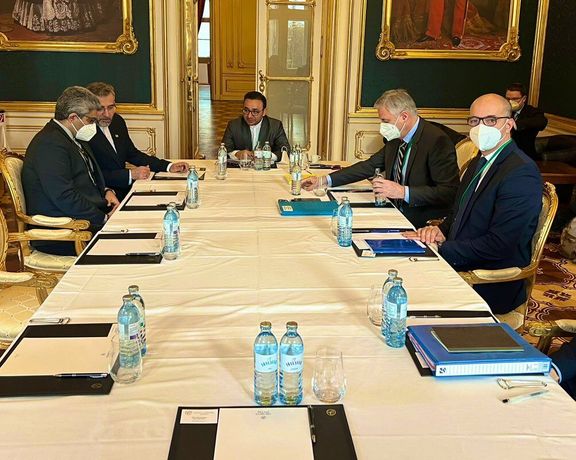
A senior European Union official said Friday that a US-Iranian deal to revive Iran's 2015 nuclear agreement was close but success depended on the political will of those involved.
"I expect an agreement in the coming week, the coming two weeks or so," the EU official said. "I think we have now on the table text that are very, very close to what is going to be the final agreement," the official said.
Reuters reported on February 17 details of a possible deal negotiated by envoys from Iran, Russia, China, Britain, France, Germany, the European Union and United States.
"Most of the issues are already agreed. But as a principle in this kind of negotiations, nothing is agreed until everything is agreed. So we still have...some questions, some of them rather political and difficult to agree," the official said.
The official said a deal was necessary as Iran's sensitive uranium enrichment program was moving ahead quickly. Iran has always denied it is seeking nuclear weapons.
"On the ground they are advancing very much at a speed that is not compatible with the long-term survival of the JCPOA," the official said, referring to the Joint Comprehensive Plan of Action, as the 2015 nuclear deal between Iran and world powers is formally titled.
Report by Reuters
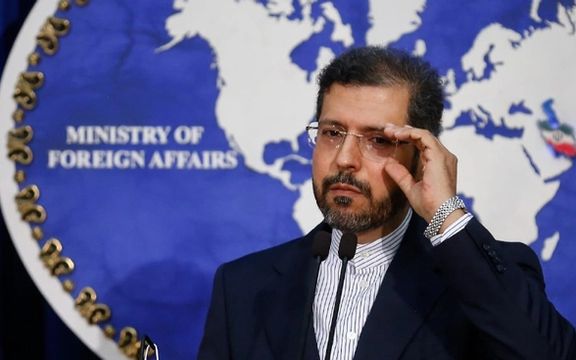
An “exclusive” report by Reuters Thursday on nuclear talks in Vienna was “misinformation disguised as reporting,” an Iranian spokesman tweeted Friday.
Saeed Khatibzadeh, who speaks for the foreign ministry, tweeted that the “final deal to let the US [United States] return to the JCPOA will be far from the unsourced spin making the rounds.” The Reuters news agency report, citing anonymous officials, claimed a series of sequenced steps would be taken in restoring the JCPOA (Joint Comprehensive Plan of Action), the 2015 nuclear deal Iran reached with world powers.
“Expect more spin as we approach final days,” Khatibzadeh warned. The spokesman pointed out that restoring the JCPOA would not be a bilateral arrangement between Iran and the US, meaning it needed endorsement by all JCPOA signatories – China, France, Germany, Iran, Russia, and the United Kingdom.
Russia's chief negotiator to the Vienna talks, Mikhail Ulyanov, in a tweet Thursday wrote that opponents of restoring the JCPOA were "becoming more proactive in the public space" and "trying to create an unhealthy atmosphere."
Reuters on Thursday claimed that a draft text of a plan to restore the JCPOA included sequenced steps including the US initially withdrawing threats to punish third parties holding Iranian assets and Iran stopping enrichment above 5 percent. The report was unclear as to whether such steps depended on prior agreement on full JCPOA restoration.
Psychological warfare
According to Reuters, the first phase of returning to the JCPOA would not include the US lifting its threat of sanctions against third parties buying Iranian oil but would see this threat lifted against South Korean banks, allowing them to transfer $7 billion owed to Iran. But in accepting that the final agreement was in daft, the news agency effectively accepted that these matters remained under discussion.
Nour News, a website close to Iran’s top security official Ali Shamkhani, earlier on Thursday claimed Reuters was distorting talks in Vienna by suggesting Iran had made major concessions. Tehran would not scale back its nuclear program as long as the US did not lift sanctions incompatible with the JCPOA, the website said, also rejecting Reuters' claim that a prisoner swap was part of the talks.
The US Special Envoy for Iran Robert Malley said on January 24 that a nuclear agreement with Tehran was unlikely without the release of Americans detained in Iran, but Iran and Russia have insisted that, whatever is discussed elsewhere, the Vienna talks should not be side-tracked.
Iran’s official news agency IRNA reported Friday that the US was putting off political decisions by setting “fake” deadlines and playing games with the media: The "Americans are trying to throw the ball into Iran's court by playing the blame game as the talks in Vienna approach the final stage.” Tasnim News Agency called the Reuters report "psychological warfare."